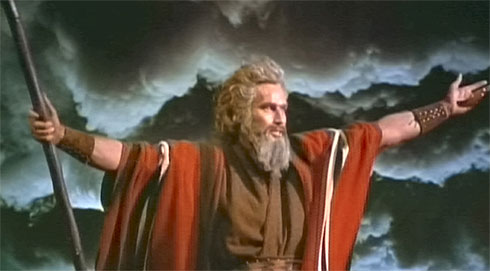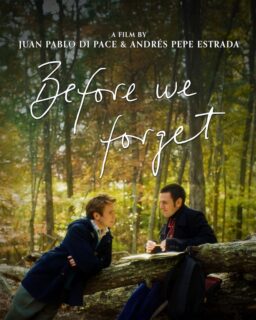There was a smile of conspiracy on the face of the Irish bartender. “Now you listen carefully, and I’ll tell you what to do,” he whispered to his blue-eyed wife.
“I want you to walk over there to Charlton Heston, and throw your stomach out, and scream at him: ‘You bloody bastard, where’s me payments for child support?’ Now can you do that much for me?”
His wife, who was expecting a child at any instant, raised her eyes toward heaven as if to ask God’s mercy on such a rascal of a husband. Then she brought her eyes back toward Earth and said, “You’re daft, that’s what you are. You’re out of your mind.” Then she smiled. “Still,” she said, “it would make a darling joke, wouldn’t it…”
Unaware of these plots being hatched against him, Charlton Heston held court in a corner of the saloon, a small establishment on North Av. “I wonder if it’s true as they say,” he said, “that all journalists are drunks.”
He poured himself a glass of half-and-half. “I suppose not,” he said. “But it’s very nearly true of English actors, you know. They’re all very serious drinkers, whether they care for it or not.”
Heston, who had not been asked for a single autograph all evening, was relaxed and at ease. His companions at the corner table were mostly newspaper reporters, known to gather at this saloon from time to time. As Heston paused to consider the foam on his glass, still another reporter arrived.
“Allow me to introduce myself,” he said. “I’m Michael McGuire, the military editor of the Tribune.”
Heston shook hands and said, “Chuck Heston. Glad to meet you. The Tribune? Ah, yes, you supported my policies in the Ben-Hur campaign.”
There was general laughter, and McGuire said he would draw the line at Moses. A look of pain crossed Heston’s face.
“Not Moses,” he said. “Please, not Moses. Since I played Moses, I’ve heard every Moses joke ever conceived by the mind of man.”
“I’ve got a new one,” said Fritz Plous, a free lance writer and rabbit skin salesman. “It’s a joke David Steinberg did at Second City.”
“Let’s have it,” said Heston.
“Well,” said Plous, “God told Moses, take off your shoes, Moses, and approach the burning bush. And Moses did, and burnt his feet. And God said Ha! Third one today!”
Heston laughed heartily. “A new one,” he said. “I wouldn’t have believed it.”
Plous, who was wearing a railroad’s conductor’s cap, took it off and bowed.
“That’s a nice conductor’s hat,” Heston said. “We ought to present it to Leonard Bernstein.”
Another pitcher of half-and-half arrived at the table, accompanied by Jim Agnew, local film buff.
“You were great as John the Baptist,” Agnew said.
“A wet assignment,” Heston said. “We did a wet scene in ‘Will Penny,’ too. It was raining, and we went right ahead shooting. It was the first time in my experience that a scene was shot in actual rain. Rain machines, yes, but never a perfectly timed shower.”
“Will Penny” is Heston’s new Western, in which he plays a real, authentic cowboy. “It’s one of my favorite roles,” he said, “because it is real, you see, and not all faked up to make it nice. It even has an unhappy ending. We shot up in the mountains in the wintertime, which is another unusual aspect. Usually you avoid shooting on location during the winter because the snow causes light problems and the shooting day is so much shorter.
“But we wanted that authenticity. The weather was just right. We got a little snow, and then a little more, and finally a blizzard. That was a switch from shooting in the desert for ‘Planet of the Apes.'”
“Also when you were John the Baptist,” Agnew said.
“You have a John the Baptist thing,” Heston said.
“Only when I smile.”
Heston tasted again of his half-and-half and smiled.
“I’m the only human being in most of ‘Planet of the Apes’,” he said. “Have you seen it? It’s an interesting film; it succeeds at several levels, including, thank heavens, the box office.”
It was also a typical Heston role, casting him as the sole standard-bearer for humanity. “I always get the super-hero parts,” he said. “That’s one nice thing about ‘Will Penny,’ I’m just an ordinary cowboy, not Ben Hur in the saddle.”
A wicked smile crossed his face. “You know,” he said softly, “that chariot race was fixed.”
“Where did you get your chariot driving lessons?” asked McGuire, the military editor.
“A good question,” said Heston. “It is a highly esoteric profession, since no Italians now alive give instructions in it. Actually, I played it by ear.”
Basil Talbott Jr., a Sun-Times reporter, ventured over from the bar (where all attempts to enlist the bartender’s wife in public accusation had apparently failed).
“I saw you in that 16mm version of ‘Julius Caesar‘ shot here in Chicago,” Talbott said. “How long ago was that?”
“Oh, Lord, 20 years or more, when I was at Northwestern,” Heston said. “We used all actual locations. The steps of the Art Institute, the Elk’s Temple, the Field Museum, the beaches of Lake Michigan. You would have sworn it was the real thing, except for the acting.”
“Actually, it’s an easy part, one of the easiest in Shakespeare. Lots of dramatic speeches and few nuances.”
“Didn’t you do ‘Antony and Cleopatra’ on Broadway?” somebody asked.
“No,” Heston said, “I did ‘Caesar and Cleopatra,’ Shaw’s play. Have you ever been in London and gone to Foyle’s Bookstore, the world’s largest used bookstore? They tell the story about the day Shaw visited there, and he was browsing through the selection of his own books. He came across a copy which he had autographed ‘with compliments,’ and given to a friend. And the friend had sold it to Foyle’s! Well, Shaw bought it back, inscribed it ‘With renewed compliments,’ and sent it back to the friend again.”
Silence.
“I guess you had to be there,” Heston said.












